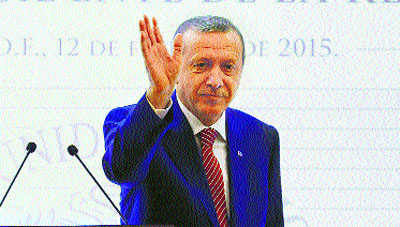
S Nihal Singh
As Turkey prepares for parliamentary elections on June 7, much is riding on it because of the ambitions of its President, Recep Tayyip Erdogan (previously re-elected Prime Minister for the third time), and the future relationship of the state with its large Kurdish minority.
After the founder, Kemal Ataturk, built modern Turkey on the ruins of the Ottoman Empire, no other leader has dominated the country's political scene as Erdogan. His two accomplishments have been to put in its place the Army, which had in effect become the state with its secular creed, and tilt the country towards a religious direction more in tune with the conservative religious mores of his main support base, Anatolia.
More than these accomplishments, Mr Erdogan has shown a pronounced tendency towards authoritarianism and his impatience with dissent, as the short work he did with massive demonstrations in Istambul’s Gezi Park a few years ago demonstrated. At the same time he has the ambition of reviving the spirit, if not the contours, of the Ottoman Empire. Indeed, the cause of the rioting was his desire to scrap the park in favour of building Ottoman-style barracks. And his new presidential palace is Ottomonesque in its grandeur.
Placing Turkey in the front ranks of world powers to reflect the glories of the Ottomans is an ambition he shares with his Prime Minister (previously Foreign Minister) Ahmet Devutoglu. The latter was made president of the ruling Justice and Development Party (AKP) because as President he was unable to hold a political party position. According to his own party constitution, he could not have contested the Prime Minister's office again.
To Mr Erdogan’s credit, he has made his ambitions clear. He wants to replace the present largely parliamentary system with a presidential one. At present the President's power is limited although he can veto legislation. The coming election’s importance lies in the fact that the AKP has to win at least 330 seats in a House of 550 to be able to submit the constitutional changes it seeks to a referendum. Mr Erdogan has pitched his own ambition at 400 seats. The AKP had 312 seats when Parliament was dissolved.
There is another sub-plot to Mr Erdogan’s ambitions. He had built his success in league with Fetullah Gulen, a cleric who lives in self-exile in the United States and has an enviable network of avid supporters in the judicial and police services in Turkey. In fact, after the falling out of the two in 2013, there were arrests of Mr Erdogan's key ministers on serious corruption charges and although they had had to resign their posts, the administration's revenge was the wholesale transfer of legions of judicial and police officials. In the AKP's lexicon today, Gulen and his movement are dirty words and it is accusing the main opposition Republican People's Party (CHP) of collusion with it. The CHP performed poorly in the recent local and presidential elections. Mr Erdogan himself won the presidential election narrowly.
Given its size, population and geography, Turkey is a major regional player. It is also a member of the North Atlantic Treaty Organisation (NATO), although some of its members wonder which side it is on. It hosts some 1.5 million Syrian refugees although it has failed to convince the United States to do more to get rid of Syrian President Bashar al-Assad. Turkey has until recently been the main transit point for jihadis going to fight in the civil war.
Turkey’s and Erdogan’s fortunes are, indeed, full of ironies. Ataturk dragged his country into the modern world over the protests of religious and conservative elements. Headscarves for women, for instance, were banned and the Turkish language was given the roman script. Not only are headscarves back, but Mr Erdogan's wife wears one in public. His main constituency in Anatolia is delighted with the revived old mores.
While the results of the parliamentary elections will decide in the short term how far Mr Erdogan will succeed in fulfilling his ambitions — polls suggest it will be a coalition government — two aspects of the country's future are unsettling friends. There is concern over the extent of Mr Erdogan's ambitions and, depending upon future events, the fate of the Kurdish problem will be decided.
The two problems are connected in a sense because Mr Erdogan had shown courage in initiating a peace process. The precepts of the previous system were of secular Turkish nationalism honed by Ataturk. It had little elasticity in the notion of Turkish nationality. The provisional truce accord of sorts with the Kurdish rebellion rests on a redefinition of the Turkish state.
Judging by Mr Erdogan's pronouncements, his dream seems to be a fusion of old Ottoman glories and a highly developed modern state guided by the precepts of Islam. It is not lost upon the President that that two of three major regional players in the Arab world are non-Arab, viz, Iran and Turkey. The third of course is Saudi Arabia.
Although as a member of NATO, Turkey remains in the Western camp, its policies have shown sufficient streaks of independence to worry Washington and other allies. It famously disallowed American troops using the Turkish route they wanted during its invasion of Iraq. Besides, Ankara has loudly voiced its disappointment over Washington’s refusal to accede to establish a no-fly zone inside Syria to rehabilitate millions of Syrian refugees now spread among neighbours with its implication of carving out sovereign space inside another country.
Turkey has a strong modern military helped in its development by American arms and largesse. However, what was once a simple military relationship between the Pentagon and a military-dominated government in Ankara has become far more complicated. The advent of the AKP has changed the political space, with the political pendulum swinging to a moderate Islamic direction with the dominant political actor, Mr Erdogan, seeking greater glory.



























